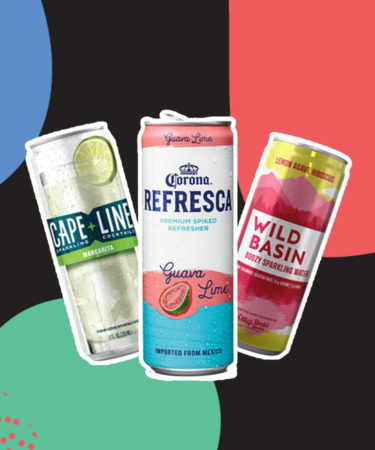On Wednesday, MillerCoors announced a new line of canned cocktails, Cape Line Sparkling Cocktails. Scheduled to debut in 2019, flavors include Blackberry Mojito, Margarita, and Hard Strawberry Lemonade.
They are filled with buzzwords: The slim-canned sparklers are low-calorie (120), gluten-free, and contain no artificial flavors. They’re 4.5 percent ABV, made with fermented cane sugar, and contain “six simple ingredients that consumers know and understand,” Sofia Colucci, vice president of innovations for MillerCoors, said. “Today, consumers want it all. They want simple ingredients, lower calories and sugar with all of the flavor.”
TBH, she’s right. Sparkling, canned boozy beverages have become an unstoppable force, and big beverage corporations like MillerCoors — and A-B, Constellation Brands, and Boston Beer — are listening. The flavored malt beverage (FMB) category is growing at more than 10 times the rate of craft beer. Health-conscious drinking trends like hard seltzer, kombucha, and low-proof cocktails are all the rage.
As unappealing as mass-produced cans of hard strawberry lemonade sound to me, the truth is, it might be exactly what people want. No matter how hard we try to turn people on to craft beer, much of the drinking population wants to get their buzz on cheap and easy.
Craft Beer Sales Reach a New High in 2018
On Tuesday, the Brewers Association released a report looking back at “the year in beer.” The major takeaways for 2018 include continued growth of craft beer sales by volume (a mid-year increase of 5 percent); positive economic impact (a 9 percent increase in craft beer jobs over 2017); and a record count of breweries, with more than 7,000 operating in the U.S. in 2018 (a projected 20 percent increase over 2017).
Craft breweries’ contribution to the U.S. economy totaled more than $76 billion in 2017, an increase of 11 percent over 2016.
These are feel-good numbers. The craft beer industry is growing, its market share is increasing, and its impact on the communities where it operates is significant.
But with growth comes growing pains. We saw this with Trillium last month; we saw it with Green Flash earlier this year; and we’ll likely continue to see it more as craft beer continues to grow.
What’s important for brewers and beer lovers to keep in mind is this: Industry growth is great, but growth isn’t enough. For these businesses to continue positively impacting their communities, it’s important their employees are properly compensated. Labor rights, community engagement, and, of course, beer quality are all more important than business expansion.
Anheuser-Busch InBev Cuts More Positions
On Thursday, Anheuser-Busch InBev notified its St. Louis employees of an unspecified number of job cuts within its supply organization. According to Brewbound, the cuts include nearly 40 jobs across North America.
A-B is not the only brewery that’s been forced to downsize because of increased competition. Global competitors such as Constellation Brands and independent producers like New Belgium have also cut back their workforces in recent months.
I hate to see people lose their jobs but, in all honesty, I don’t see much drama here. I see a business adapting to a finicky marketplace. Craft beer sales by volume are growing, but so is competition with Big Beer. Everything from spiked seltzer to cannabis to sobriety is threatening to take a piece of beer’s pie. As A-B’s market share slowly inches downward, it has to make up the difference somehow. It’s a bummer, but that often comes down to cutting staff positions.
Like major publishers slashing their staff writers, it’s the unfortunate reality of a competitive business desperately trying to hold onto a consumer base that no longer exists.
